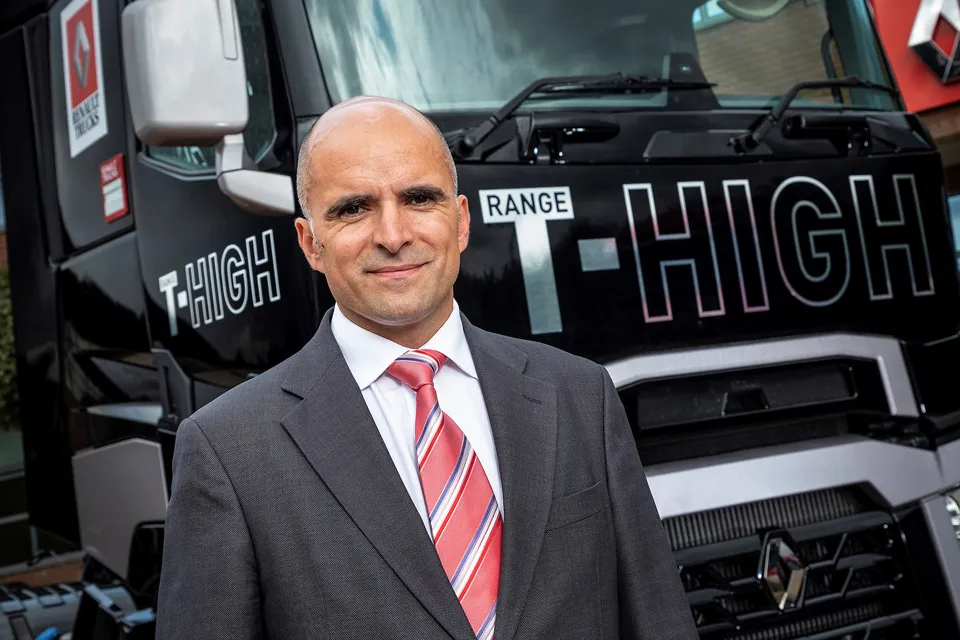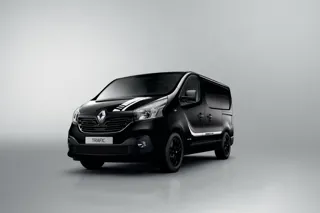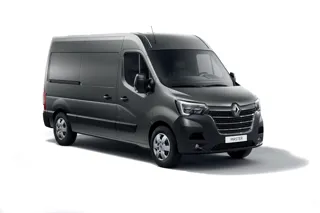Renault Trucks intends to ramp up its UK sales and market share significantly between now and 2022 according to UK managing director, Carlos Rodrigues.
“We’ve been cruising at around 5% and we’re not happy with that,” Rodrigues said. “We’ve got the products, the quality has improved a lot and we deserve to do better.”
One of the strategies the manufacturer is implementing to achieve its goal is the strengthening of the after-sales back-up offered to fleets.
Renault and its private capital dealers will be investing around £30 million over the next five years.
“The network is aiming to recruit 100 more staff, we’ve already got 120 apprentices and we’ve introducing a programme to transform car and van mechanics into truck mechanics,” said Rodrigues (pictured).
The programme should help address a severe shortage of truck technicians that is affecting manufacturers across the country.
Renault Predictive Maintenance
A predictive maintenance package is being rolled out across 15 countries in a bid to reduce downtime and will come to the UK in 2020.
Commercial trucks and services director James Charnock is adamant Renault Trucks can steadily increase its vehicle sales. The construction industry is among those sectors helping to generate registrations.
“We’re seeing a lot of growth with the Range C tipper,” Charnock said.
Aware that many fleets are often desperate to get trucks as fast as they can because they are starting new contracts, the company has more than 50 Range C and D bodied chassis in the pipeline available for prompt delivery under the Ready for Business banner.
“We’ve got 25 tippers, 13 tipper grabs, six skip loaders, four hook loaders, four sweepers and three mixers,” he said.
“The Range T High tractor unit is proving to be highly successful.”
Right-hand drive model production is being upped in response to demand.
Renault is also giving due consideration to the second-hand sector.
A core network of nine specialist used centres based at existing dealerships is being established and products from the company’s so-called used trucks factory in France are being marketed in the UK.
The rejuvenated vehicles it produces are based on Renaults no more than three-to-four years old sourced from leasing companies. They include the T P-Road, a powerful 430PS 18-tonner converted from a tractor unit.
Looking to the future, Renault Trucks believes diesel still has plenty of potential.
“We strongly believe that it is – and will remain – the best solution for long-distance transport, not just for the next three-to-five years but for more than that,” said Renault Trucks Europe senior vice-president Jean-Claude Bailly.
Yet, while diesel may be the preferred answer for intercity journeys, electric vans and trucks look set to dominate local distribution, he added, especially in urban areas.
Renault 40th anniversary
Celebrating its 40th anniversary in the UK this year, Renault Trucks is developing an electric line-up grossing at up to 26 tonnes.
“In France, we’ve just delivered the first Range D Wide ZE electric to Lyon’s city council,” Bailly said.
In the UK, a growing number of customers are asking about the Range D and D Wide ZEs, said Rodrigues, with the first deliveries set for early 2020.
“We’ve been preparing for the shift to electric vehicles for more than 10 years now,” he said. “Electromobility is the obvious response to issues surrounding urban air quality and noise.”
Renault Trucks is also marketing the battery-powered Master ZE and has just supplied its first one to a British operator.
A nine-seater wheelchair-accessible minibus conversion, it is linked to Kent County Council and is being operated by the Compaid charity. It provides transport services to vulnerable people and those with disabilities.
Renault is investing more than £29m in a research and development centre in Lyon. Employing around 1,000 people, it is scheduled to open in 2021.
Areas that truck manufacturers’ research and development departments are addressing include driverless trucks.
While they may have a role to play in self-contained areas such as open-cast mines or ports, don’t expect them to appear on British motorways any time soon, said Rodrigues.
“That will take time,” he observed.



















Login to comment
Comments
No comments have been made yet.